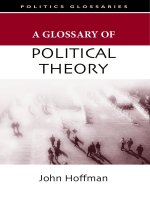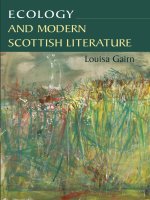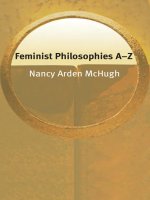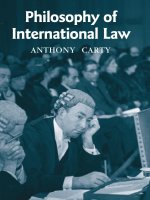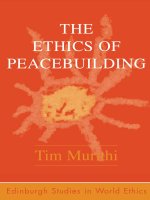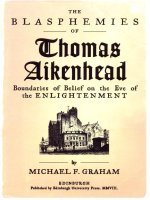edinburgh university press christian philosophy a-z jul 2006
Bạn đang xem bản rút gọn của tài liệu. Xem và tải ngay bản đầy đủ của tài liệu tại đây (937.01 KB, 263 trang )
Christian Philosophy A–Z
Daniel J. Hill and
Randal D. Rauser
A handy guide to the major figures and issues in Christian philosophy from
Augustine to the present.
This volume covers a broad historical sweep and takes into account those
non-Christian philosophers that have had a great impact on the Christian tradition.
It concentrates, however, on the issues that perplex Christian philosophers as they
seek to think through their faith in a philosophical way and their philosophical
beliefs in the light of their faith. Examples of the topics discussed are the question
of whether and how God knows the future, whether we actually know that God
exists, and what Athens has to do with Jerusalem.The leaders of the recent revival
of Christian analytic philosophy, especially Alvin Plantinga, Nicholas Wolterstorff,
William Alston and Robert Adams are also included.
This book will be of interest to those studying Christian philosophy and to
Christians seeking to think philosophically about their faith.
Daniel J. Hill is Lecturer in Philosophy at the University of Liverpool.
Randal D. Rauser is Assistant Professor of Historical Theology,Taylor Seminary,
Edmonton,Alberta, Canada
Cover design: River Design, Edinburgh
Edinburgh University Press
22 George Square, Edinburgh EH8 9LF
www.eup.ed.ac.uk
ISBN 0 7486 2152 0
Daniel J. Hill and Randal D. Rauser
barcode
Edinburgh
Daniel J. Hill
&
Randal D. Rau
ser
PHILOSOPHY A–Z SERIES
GENERAL EDITOR: OLIVER LEAMAN
These thorough, authoritative yet concise alphabetical guides introduce the
central concepts of the various branches of philosophy.Written by established
philosophers, they cover both traditional and contemporary terminology.
Features
• Dedicated coverage of particular topics within philosophy
• Coverage of key terms and major figures
• Cross-references to related terms.
Christian Philosophy A–Z
Christian Philosophy A–Z
Christian Philosophy 18/4/06 12:39 pm Page 1
P1: FCG/SPH P2: FCG/SPH QC: FCG/SPH T1: FCG
EUBK021-Hill/Rauser May 30, 2006 17:22
CHRISTIAN PHILOSOPHY A–Z
i
P1: FCG/SPH P2: FCG/SPH QC: FCG/SPH T1: FCG
EUBK021-Hill/Rauser May 30, 2006 17:22
Volumes available in the Philosophy A–Z Series
Epistemology A–Z, Martijn Blaauw and Duncan Pritchard
Ethics A–Z, Jonathan A. Jacobs
Indian Philosophy A–Z, Christopher Bartley
Jewish Philosophy A–Z, Aaron W. Hughes
Philosophy of Religion A–Z, Patrick Quinn
Forthcoming volumes
Aesthetics A–Z, Fran Guter
Chinese Philosophy A–Z,BoMou
Feminist Philosophy A–Z, Nancy McHugh
Islamic Philosophy A–Z, Peter Groff
Philosophical Logic A–Z, J. C. Beall
Philosophy of Language A–Z, Alessandra Tanesini
Philosophy of Mind A–Z, Marina Rakova
Philosophy of Science A–Z, Stathis Psillos
Political Philosophy A–Z, Jon Pike
ii
P1: FCG/SPH P2: FCG/SPH QC: FCG/SPH T1: FCG
EUBK021-Hill/Rauser May 30, 2006 17:22
Christian Philosophy A–Z
Daniel J. Hill
and
Randal D. Rauser
Edinburgh University Press
iii
P1: FCG/SPH P2: FCG/SPH QC: FCG/SPH T1: FCG
EUBK021-Hill/Rauser May 30, 2006 17:22
C
Daniel J. Hill and Randal D. Rauser, 2006
Edinburgh University Press Ltd
22 George Square, Edinburgh
Typeset in 10.5/13 Sabon
by TechBooks India, and printed and
bound in Finland by WS Bookwell
A CIP record for this book is
available from the British Library
ISBN-10 0 7486 2212 8 (hardback)
ISBN-13 978 0 7486 2212 2 (hardback)
ISBN-10 0 7486 2152 0 (paperback)
ISBN-13 978 0 7486 2152 1 (paperback)
The rights of Daniel J. Hill and Randal D. Rauser
to be identified as authors of this work
have been asserted in accordance with
the Copyright, Designs and Patents Act 1988.
iv
P1: FCG/SPH P2: FCG/SPH QC: FCG/SPH T1: FCG
EUBK021-Hill/Rauser May 30, 2006 17:22
Contents
Series Editor’s Preface
vii
Introduction ix
Acknowledgements xiii
Christian Philosophy A–Z 1
Bibliography 201
v
P1: FCG/SPH P2: FCG/SPH QC: FCG/SPH T1: FCG
EUBK021-Hill/Rauser May 30, 2006 17:22
This book is lovingly and gratefully
dedicated to our respective parents.
vi
P1: FCG/SPH P2: FCG/SPH QC: FCG/SPH T1: FCG
EUBK021-Hill/Rauser May 30, 2006 17:22
Series Editor’s Preface
One of the things that Christian philosophy has going for it
is a central text, the New Testament, written in Greek. Greek
is a highly appropriate language for philosophy, abstract and
capable of fine conceptual distinctions, something the more
concrete and basic Hebrew of the Old Testament had diffi-
culty accomplishing. The traditional conflict between Athens
and Jerusalem, between philosophy and religion, was often
thus muted in Christianity since their religion was from the
start pretty firmly established in Athens, at least linguistically
speaking. The development of Christian philosophy was rapid
since even in the early Christian communities the growth of
the religion took place in a cultural environment where phi-
losophy also flourished. Ever since then the ideas and issues
of Christianity have been extensively explored using the var-
ious philosophical techniques that have arisen within differ-
ent philosophical traditions. It is often difficult to understand
what is going on in Christian philosophy, though, since the
blend of philosophy and religion may make the reader unsure
precisely what argument is being presented, or how it is sup-
posed to work. It is the aim of Daniel Hill and Randal Rauser’s
guide to the vocabulary of the debate to throw light on this
and other aspects of Christian philosophy, and we hope that
readers will find it useful in gaining a pathway through this
interesting intellectual territory.
Oliver Leaman
vii
P1: FCG/SPH P2: FCG/SPH QC: FCG/SPH T1: FCG
EUBK021-Hill/Rauser May 30, 2006 17:22
viii
P1: FCG/SPH P2: FCG/SPH QC: FCG/SPH T1: FCG
EUBK021-Hill/Rauser May 30, 2006 17:22
Introduction
Fifty years ago a scan of bookshop shelves would have been
as likely to find a dictionary of terms for alchemy as one for
Christian philosophy. Indeed, one might well have thought
that, though of course there were some Christian philosophers
then, they were doomed to the same fate as the dodo. But,
in a stunning reversal, today Christian philosophy is among
the most vibrant areas of philosophy. While the story of that
change is still being written, there are a few key factors. On
the negative side, the last fifty years have seen the demise of
some historically formidable opponents to Christian philoso-
phy, most perspicuously logical positivism and classical foun-
dationalism, and this demise is due in significant part to the
work of Christian philosophers. On the positive side, there
has been a revitalisation of Christian philosophy from a num-
ber of sources, including the renewal of Catholic philosophy
after the broadening of the Second Vatican Council as evi-
dent, for instance, in the diversity of the American Catholic
Philosophical Association. Another significant factor is the
work of several key philosophers coming out of (or sympa-
thetic to important features of) the Dutch Calvinist tradition.
Philosophers such as Alvin Plantinga, Nicholas Wolterstorff
and William Alston (who, though not a Calvinist, has sympa-
thy with the broad approach of Plantinga and Wolterstorff)
have provided a formidable body of original philosophical
work, all in accord with, or explicitly building upon, their
Christian convictions. This new vibrancy led to the founding
ix
P1: FCG/SPH P2: FCG/SPH QC: FCG/SPH T1: FCG
EUBK021-Hill/Rauser May 30, 2006 17:22
x
INTRODUCTION
of the Society of Christian Philosophers in 1978 and the es-
tablishment of its journal Faith and Philosophy in 1984. One
of the first articles to be published in this journal, Plantinga’s
seminal address ‘Advice to Christian Philosophers’ (Plantinga
1984), has served as a clarion call to a new generation to ap-
proach philosophy without apology from a distinctively Chris-
tian perspective. And Christian philosophers continue to do
so.
Although North America has seen the greatest growth in
Christian philosophy, there has been a slower revival in other
English-speaking countries, particularly in the UK. In England,
Oxford University has, and London University’s King’s
College had until recently, a ‘named chair’ for philosophy of
religion held by an eminent Christian philosopher: the chair
at Oxford was held recently by Richard Swinburne, who was
followed by Brian Leftow; and the chair at London was held
most recently by Paul Helm. Each of these has done much to
advance the field of Christian philosophy in the UK, not least
through the British Society for Philosophy of Religion, which
developed out of the UK Society of Christian Philosophers.
All this means that while alchemy remains an obscure
footnote in the history of science, Christian philosophy has
emerged as one of the liveliest fields in current philosophy.
For that reason, the need grows for a manageable reference
guide for students and the interested layperson to the specific
tasks and concerns of Christian philosophy, and it is to that
need that this book is aimed.
Unfortunately, the task of composing a dictionary is a pre-
carious one, as one is bound to leave out certain terms, move-
ments, positions, or individuals that one or more readers will
view as an egregious omission. The best way to respond to
inevitable disappointment is to be clear on our criteria for
including the particular definitions that we have. In short,
we have included particular terms, movements, theories and
individuals based on two criteria: either they put forward a
P1: FCG/SPH P2: FCG/SPH QC: FCG/SPH T1: FCG
EUBK021-Hill/Rauser May 30, 2006 17:22
INTRODUCTION
xi
distinctively Christian philosophy or they suggest a distinc-
tively Christian reply. Of course, not every such theory or
individual can be included in a small volume such as this one,
but we have tried to include all those that, in our judgement,
have had such a significant impact on the field of Christian
philosophy that the student or interested layperson is likely to
come across them in some context or other. This judgement
was not made in a scientifically precise manner, and no doubt
some people will still respond that if x is included then so
should y be. As long as we have not omitted those that should
have been included within the confines of the space permitted
we are less concerned about having included those that could
(or even should) have been omitted. Nevertheless, the authors
would welcome constructive feedback concerning the choice
of entries as well as concerning the entries themselves.
P1: FCG/SPH P2: FCG/SPH QC: FCG/SPH T1: FCG
EUBK021-Hill/Rauser May 30, 2006 17:22
xii
P1: FCG/SPH P2: FCG/SPH QC: FCG/SPH T1: FCG
EUBK021-Hill/Rauser May 30, 2006 17:22
Acknowledgements
A dictionary such as this cannot be completed without help
from others in the discipline. We therefore gratefully thank
all those that came to our aid whether with single suggestions
or, as is the case with Paul Helm and Tony Garrood, read-
ing through the entire manuscript. In particular, we’d like to
thank the members of the Tyndale-House 2005 Colloquium
in Philosophy of Religion, especially Joseph Jedwab, for help-
ful suggestions. We’d also like to thank Stephen Clark, Lydia
Jaeger and Richard Sturch for helpful comments, and two
anonymous readers for Edinburgh University Press. We are
just as grateful to our wives and families for being so patient
during the completion of the task, and particular thanks are
extended to James, Marcus and Tim for their patience dur-
ing the ‘holiday’. Thanks are equally due to those that gave
prayer support, especially Steve, Phil, Hugh and Chris. Fi-
nally, we thank Oliver Leaman, series editor, and the staff of
Edinburgh University Press, especially Jackie Jones and Carol
Macdonald, for their help and patience.
xiii
P1: FCG/SPH P2: FCG/SPH QC: FCG/SPH T1: FCG
EUBK021-Hill/Rauser May 30, 2006 17:22
xiv
P1: FCG/SPH P2: FCG/SPH QC: FCG/SPH T1: FCG
EUBK021-Hill/Rauser May 30, 2006 7:20
Christian Philosophy A–Z
1
P1: FCG/SPH P2: FCG/SPH QC: FCG/SPH T1: FCG
EUBK021-Hill/Rauser May 30, 2006 7:20
2
P1: FCG/SPH P2: FCG/SPH QC: FCG/SPH T1: FCG
EUBK021-Hill/Rauser May 30, 2006 7:20
A
a posteriori/a priori:Abelief is a posteriori if it is held on
the basis of experience, and is a priori if it is held on a
basis other than experience (or held on no basis at all).
Of course, one individual may believe a proposition on
the basis of experience and another may believe it on a
different basis: for example, you may believe Pythagoras’
theorem on the basis of your reasoned proof of it, and
I may believe it on the basis that I heard you tell me it
was true and that in the past I have found you to be re-
liable. It follows that this distinction must be drawn at
the level of individual token instances of belief, not at
the level of propositions believed. Belief in God would be
held a priori if, for example, it were held on the basis of
the ontological argument. Belief in God would be held
a posteriori if, for example, it were held on the basis of
the argument to design.
See argument, ontological; belief; argument from/to
design; empiricism; rationalism; reason; theology,
natural
Further reading: Geivett and Sweetman 1993; Moser
1987
3
P1: FCG/SPH P2: FCG/SPH QC: FCG/SPH T1: FCG
EUBK021-Hill/Rauser May 30, 2006 7:20
4
CHRISTIAN PHILOSOPHY A–Z
Abelard/Abailard, Peter (1079–1142): The leading, and most
quarrelsome, philosopher and theologian of his time,
Abelard was inclined to the nominalistic school of
thought concerning universals: the view that universals
are mere linguistic items that can be predicated of many
individuals. Abelard also wrote on the atonement, claim-
ing that its value lay in the response it evoked from us,
and on the compatibility of divine foreknowledge and
freedom. He placed high importance on the rational de-
fence of the Christian faith, his high view of reason being
evident in his Sic et Non (‘Yes and No’), in which he
invites the reader to use reason to reconcile apparently
contradictory theological authorities. After his love affair
with H
´
elo
¨
ıse went disastrously wrong, Abelard finished
his days as a monk and teacher in a variety of monaster-
ies. The monuments in the cemetery of P
`
ere Lachaise to
him and H
´
elo
¨
ıse are a site of pilgrimage for lovers even
today.
See foreknowledge and freedom, problem of; nominal-
ism; philosophy, medieval; universals
Further reading: Abelard 1849–59, 1855, 1969–87 and
1977; Brower and Guilfoy 2004; Geyer 1919–33; Maren-
bon 1997
action, divine: Theists, as opposed to deists, believe that God
acts in the world as well as creating the world. More-
over, most theists believe that God not only conserves the
world in being moment by moment, but that he also in-
tervenes in the running of the world from time to time in
a miraculous way: so-called ‘special divine action’. Philo-
sophical discussion focuses on the one hand on the defini-
tion of divine conservation and its relation to secondary
agency and, on the other, on whether God can do mir-
acles and what the difference is between God’s mirac-
ulous intervention and his ordinary action. Christian
P1: FCG/SPH P2: FCG/SPH QC: FCG/SPH T1: FCG
EUBK021-Hill/Rauser May 30, 2006 7:20
CHRISTIAN PHILOSOPHY A–Z
5
philosophers believe that the greatest divine action was
the incarnation.
See conservation, divine; deism; incarnation; miracle;
theism
Further reading: Hebblethwaite and Henderson 1990;
Morris 1988; Tracy 1994; Wiles 1993
Adams, Marilyn McCord (1943–): A co-founder and past
president of the Society of Christian Philosophers,
Marilyn Adams has done much work in the history of
medieval philosophy, including a two-volume work on
William of Ockham. She has also written on the problem
of evil, asking whether ‘horrendous evils’ give us reason
to doubt the goodness of God. In addition, Adams has
written on the question of whether God’s beliefs about
one’s future free actions are compatible with their free-
dom, suggesting that God’s fore-belief may not be a ‘hard
fact’ about the past. She is a priest of the Episcopal Church
in the USA, married to Robert Merrihew Adams, and is
currently Regius Professor of Divinity at Oxford.
See Adams, Robert Merrihew; foreknowledge and free-
dom, problem of; hard-fact/soft-fact debate; Ockham,
William of; philosophy, medieval; Society of Christian
Philosophers
Further reading: Adams, Marilyn McCord 1987 and
1999
Adams, Robert Merrihew (1937–): A co-founder and past
president of the Society of Christian Philosophers, Robert
Adams has wide-ranging interests: he has written on
ethics, where his work has included a defence of the
divine-command theory, has discussed the problem of
evil and whether there is a best of all possible worlds,
and has tackled the question of middle knowledge, argu-
ing that God does not have knowledge of what one would
P1: FCG/SPH P2: FCG/SPH QC: FCG/SPH T1: FCG
EUBK021-Hill/Rauser May 30, 2006 7:20
6
CHRISTIAN PHILOSOPHY A–Z
have freely done in non-actual circumstances. He has also
written an important book on Leibniz. He is married to
Marilyn McCord Adams.
See Adams, Marilyn McCord; ethics, divine com-
mand theory of; knowledge, middle; Leibniz, Gottfried
Wilhelm; Society of Christian Philosophers
Further reading: Adams, Robert Merrihew 1987 and
1994
agnosticism: Agnosticism is variously defined as (1) lack of
belief in God, (2) lack of belief in God and lack of belief
that there is no God, (3) the view that the existence of
God cannot be proved, and (4) the view that the existence
of God cannot be proved and cannot be disproved. Of
these, (2) seems best, as (1) and (3) would lump atheists
in with agnostics, and (4) would lump many theists in
with agnostics too.
See atheism; theism
Further reading: Hume 1974; Kenny 2004
Albert the Great (c. 1200–80): Now chiefly remembered as
Thomas Aquinas’ tutor in the Dominican schools at
Cologne and Paris, and as the one that introduced him to
Aristotle’s work, Albert the Great (or Albertus Magnus)
did, however, leave a very substantial body of writings of
his own, including many expositions of Aristotelian texts
and of ancient and Arabic commentaries on Aristotelian
texts. His wide-ranging work, which included not just
philosophical and theological texts but also, reflecting his
empiricist bent, texts on natural history, such as the first
Western text on horticulture, merited him the nickname
of ‘Doctor Universalis’.
See Aquinas, Thomas; Aristotelianism
Further reading: Albert the Great 1951–; Meyer and
Zimmermann 1980; Weisheipl 1980
P1: FCG/SPH P2: FCG/SPH QC: FCG/SPH T1: FCG
EUBK021-Hill/Rauser May 30, 2006 7:20
CHRISTIAN PHILOSOPHY A–Z
7
Alston, William Payne. (1921–): A leading Christian philoso-
pher, a co-founder and past president of the Society of
Christian Philosophers and founding editor of the jour-
nal Faith and Philosophy, William P. Alston also edits
the important monograph series Cornell Studies in the
Philosophy of Religion, and was President of the Central
(then called ‘Western’) Division of the American Philo-
sophical Association. His philosophy is of a realistic bent,
and this shows itself in his work on truth, meaning and
metaphysics, as well as in philosophy of religion, in which
he has argued, contrary to those that claim it is entirely
equivocal or analogical, that there is a ‘univocal core’ to
religious discourse, and that much of our thought about
God is literally true. Alston’s work in philosophy of re-
ligion has also been groundbreaking where it has inter-
sected with his innovative contributions to epistemology.
Perhaps particularly notable is his defence of the ratio-
nality of religious belief based on ‘mystical perception’ –
the perception of God associated with religious experi-
ences. He has argued that since we treat beliefs based on
sense perception as rational we should treat beliefs based
on mystical perception as rational too. Alston also taught
Alvin Plantinga when the latter was a graduate student.
See analogy; experience, religious; Plantinga, Alvin;
Society of Christian Philosophers; univocal
Further reading: Alston 1989a, 1989b and 1993;
Howard-Snyder 2004; Morris 1994.
altruism: Altruism is disinterested benevolence. In other
words, an action is altruistic if it is done solely for the ben-
efit of another. Christian philosophers differ on whether
it is possible for us to be altruistic. Hobbes took the ex-
treme view that altruism was totally impossible. A com-
mon Calvinistic line is that altruism is impossible before
becoming a Christian, but possible afterwards, though
P1: FCG/SPH P2: FCG/SPH QC: FCG/SPH T1: FCG
EUBK021-Hill/Rauser May 30, 2006 7:20
8
CHRISTIAN PHILOSOPHY A–Z
only thanks to the indwelling power of the Holy Spirit.
Other Christians claim that altruism is possible, albeit not
easy enough to earn one’s place in Heaven thereby.
See Calvinism; Hobbes, Thomas
Further reading: Gauthier 1970; Hobbes 1839–45;
Nagel 1970
analytical philosophy See philosophy, analytical
analogy: A word is used univocally in two contexts when it
has the same meaning in each. A word is used equivocally
in two contexts when it has a totally different meaning
in each. A word is used analogically in two contexts
when its meaning in one context is similar to, though not
identical with, its meaning in the other context. These
terms are important in the debate concerning religious
language, in which Thomas Aquinas claimed that most
important (non-negative) religious language about God
was analogical.
See equivocal; language, religious; univocal
Further reading: Ross 1981; Sherry 1976a; Sherry
1976b
annihilationism see Hell
Anscombe, Gertrude Elizabeth Margaret (1919–2001): A vig-
orous, and vigorously Roman-Catholic, English philoso-
pher, Anscombe made contributions to many different
philosophical fields: philosophy of mind and action,
moral philosophy and the history of philosophy, to name
but a few. In each of these fields her admiration for Aris-
totle was evident: in the philosophy of mind she rejected
substance dualism in favour of the view that the soul was
the form of the body, in moral philosophy she defended
virtue ethics, and she wrote some papers on Aristotle
P1: FCG/SPH P2: FCG/SPH QC: FCG/SPH T1: FCG
EUBK021-Hill/Rauser May 30, 2006 7:20
CHRISTIAN PHILOSOPHY A–Z
9
himself. She also did much to translate and promote
the writings of her mentor, Wittgenstein. Her philoso-
phy was not merely ‘pure’; she applied her ethical views,
writing pamphlets against the use of the atom bomb
and against contraception, and even taking direct action
against abortion clinics. She was married to Peter Thomas
Geach.
See Aristotelianism; ethics, virtue; Geach, Peter
Thomas; Wittgenstein, Ludwig Josef Johann
Further reading: Anscombe 1981a, 1981b and 1981c;
Gormally 1994; Teichmann 2000
Anselm of Canterbury (c. 1033–1109): Sometimes called ‘the
father of scholasticism’, Anselm bequeathed to Christian
philosophy the method of ‘faith seeking understanding’
(refined from Augustine of Hippo) and an argument, the
ontological argument for the existence of God,tobe
found in hisProslogion (‘Address’). Scholarly controversy
rages, however, over whether Anselm really meant his
meditation, composed, as it was, in a Benedictine abbey,
to be understood as an argument to convince the unbe-
liever, and philosophical argument rages as to whether the
ontological argument ought to convince anyone. Many
modern Christian philosophers have adopted Anselm’s
method of thinking through their already held religious
commitments. This method may be seen in the Proslo-
gion and its companion the Monologion (‘Soliloquy’), in
which Anselm gives a version of the cosmological argu-
ment for the existence of God and then gives a list of
God’s attributes with supporting argument, based on his
famous definition of God as ‘that than which no greater
can be conceived’. It may also, however, be seen in some
of Anselm’s more theological works, such as Cur Deus
Homo (‘Why God Became Human’), which is an inves-
tigation into why the incarnation and atonement were
P1: FCG/SPH P2: FCG/SPH QC: FCG/SPH T1: FCG
EUBK021-Hill/Rauser May 30, 2006 7:20
10
CHRISTIAN PHILOSOPHY A–Z
necessary, arguing that God’s honour must be satisfied,
and that it can be satisfied only by an infinite sacrifice from
a member of the offending family, humanity. Anselm’s
significance can be judged from the fact that the original
title of the Proslogion, Augustine’s phrase ‘fides quaerens
intellectum’ (‘faith seeking understanding’), could well
be said to be the slogan of the contemporary revival in
Christian philosophy, along with another phrase from
Anselm, ‘credo ut intellegam’ (‘I believe in order that I
may understand’).
See argument, cosmological; argument, ontological;
Augustine of Hippo; fides quaerens intellectum; scholas-
ticism
Further reading: Anselm of Canterbury 1938–61, 1998
and 2000; Davies and Leftow 2004; Hopkins 1972
antirealism see realism
apologetics: Apologetics is the rational defence of the faith.
Christian philosophers differ over the importance and
methods of apologetics. Some hold that it is a duty on
every Christian to be able to give positive arguments in
favour of his or her beliefs. Others hold that the only duty
is to rebut arguments against Christianity. A middling po-
sition is held by those that claim that the Christian can
and ought to provide negative arguments against non-
Christian worldviews even if he or she cannot buttress
his or her own views with positive arguments. One could
also shift the apologetic duty from the individual to the
broader Christian community such that individual Chris-
tians need not have the resources to defend Christianity
so long as there are some individuals within the commu-
nity that are so able.
See argument, cosmological; argument, ontological;
God, arguments for the existence of
